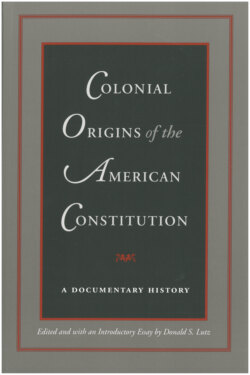Читать книгу Colonial Origins of the American Constitution - Группа авторов - Страница 21
На сайте Литреса книга снята с продажи.
Оглавление14
[Massachusetts Agreement on the Legislature]
May 14, 1634
While not a true constitution like the Pilgrim Code of Law [20], to be written two years later, this document contains a number of recognizably constitutional elements. A General Court, or legislature, is formally established, its powers are outlined, the manner of electing its members is described, and the frequency of its meetings is stipulated. The legislature rests ultimately on popular sovereignty, but it appears that sovereignty is passed to the legislature, much as with its apparent model—the British Parliament, and the people retain only their electoral power as the residual of their sovereignty. Even without the indecipherable passages that marred the previous document, parts of the Massachusetts Agreement remain equally obscure. Together with earlier documents, this one illustrates clearly the gradual, fitful evolution of a viable constitutional form. It is of interest that the protoconstitution is written and adopted by the legislature already sitting.
From Shurtleff, Massachusetts Colonial Records: Vol. I, 116–20. An explanation of the events surrounding this document can be found in James K. Hosmer, ed., Winthrop’s Journal, vol. 1 (New York, 1908).
Att a General Courte, holden at Boston, May 14th, 1634 [ ] it is agreed, that none but the Generall Court hath power to chuse and admitt freemen.
That none but the Generall Court hath power to make and establishe lawes, nor to elect and appoynt officers, as Governor, Deputy Governor, Assistants, Tresurer, Secretary, Captain, Leiuetenants, Ensignes, or any of like moment, or to remove such upon misdemeanor, as also to sett out the dutyes and powers of the said officers.
That none but the Generall Court hath power to rayse moneyes & taxes, & to dispose of lands, viz, to give & confirme proprietyes ...
It was further ordered, that the constable of every plantation shall, upon proces receaved from the Secretary, give tymely notice to the freemen of the plantation where hee dwells to send soe many of their said members as the process shall direct, to attend upon publique service; & it is agreed, that noe tryall shall passe upon any, for life or banishment, but by a jury soe summoned, or by the Generall Courte.
It is likewise ordered, that there shal be foure Generall Courts held yearely, to be summoned by the Governor, for the tyme being, & not to be dissolved without the consent of the major parte of the Court.
It was further ordered, that it shal be lawfull for the freemen of every plantation to chuse two or three of each towne before every Generall Court, to confere of & prepare such publique busines as by them shal be thought fitt to consider of at the nexte Generall Court, & that such persons as shal be hereafter soe deputed by the freemen of [the] severall plantations, to deale in their behalfe, in the publique affayres of the commonwealth, shall have the full power and voyces of all the said freemen, deryved to them for the makeing & establishing of Lawes, graunting of lands, etc., & to deale in all other affaires of the commonwealth wherein the freemen have to doe, the matter of election of magistrates & other officers onely excepted, wherein every freeman is to gyve his own voyce ...
There is leave graunted to the inhabitants of Newe Towne to seek out some convenient place for them, with promise that it shal be confirmed unto them, to which they may remove their habitations, or have as an addition to that which already they have, provided they doe not take it in any place to prejudice a plantation already setled ...
It was further ordered, that if any Assistant, or any man deputed by the freemen to deale in publique occasions of the commonwealthe, doe absent himselfe without leave in tyme of publique business, hee shal be fined att the discretion of the Court.
It is further ordered, that in all rates & publique charges, the townes shall have respect to levy every man according to his estate, & with consideration of all other his abilityes, whatsoever, & not according to the number of his persons.
